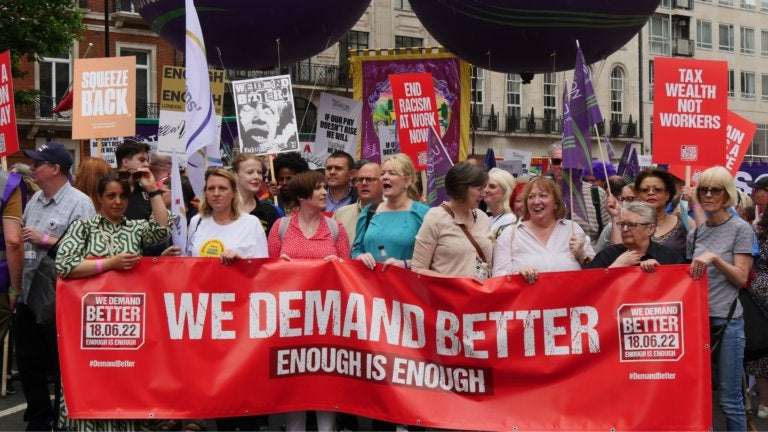Asked whether she thought the government was listening to people’s concerns, she replied: “I think we need to go back to the days of general strike, I think that’s probably what it’s going to take.”
Members of the RMT union, which has confirmed that three days of strike action will go ahead across the rail network in late June, joined the march to show solidarity with workers in other low-paid professions. The union claims it could be the largest strike in rail history, grinding services across the country to a halt.
Jo Sherman described how her mother is having to cut back on the specialist food she needs for her health condition, to pay her energy bills. Image: Evie Breese / The Big Issue
“We are calling on the entire labour movement and working class people in this country to rally behind us, and for everyone to seek an improvement in their life,” Eddie Dempsey, RMT assistant general secretary, told The Big Issue.
To those critical of the rail strikes, Dempsey said: “We are your friends. If you haven’t had a pay rise, we are the people that are going to help you get it. We’re out here with postal workers, nurses, teachers, everyone who’s had a kicking over the past few years, we are ready to coordinate action and help you get the same thing.”
Public sector workers, including those in the NHS, teachers and council workers have taken the greatest hit to their paypackets, with wages rising by just 1.5 per cent compared with the same period last year, according to recently released data from the Office for National Statistics.
The Communication Workers Union which represents people working for BT, Openreach and EE will ballot for national strike action for the first time in 35 years. Image: Evie Breese / The Big Issue
In comparison, those in the private sector saw pay rises on average of eight per cent.
“Above-inflation pay rises won’t just ease financial hardship for employees in the NHS, schools, care, councils and police. Decent wage increases will protect essential services too by ensuring experienced staff stay and new recruits keep joining,” said Jon Richards, assistant general secretary of Unison.
Growing unrest among trade unions has caused many to question whether there will be a national strike, after union leaders at GMB and Unison suggested they would be willing to coordinate strike action if the situation continues to escalate.
Thousands of people are lining up behind their unions ready to march – we’ve got rousing speeches against injustice but it’s also a carnival of hope for better @[email protected]/FhrgCeACmL — Evie Breese (@EvieBreese) June 18, 2022
A government spokesperson said: “We understand that people are struggling with rising prices which is why we have acted to protect the 8 million most vulnerable British families through at least £1,200 of direct payments this year.
“Through our £37bn support package we are also saving the typical employee over £330 a year through a tax cut in July and allowing people on Universal Credit to keep £1,000 more of what they earn.
“The Government is determined to make work pay and in April we increased the National Living Wage to £9.50, the largest ever increase since its introduction in 2016.
“In the long-term, we are committed to building a high skilled, high wage economy that delivers on our ambition to make the UK the best place in the world to work.”
Demonstrations also took place across Ireland, organised by the Cost of Living Coalition, inDublin, Cork, Limerick, Galway and Sligo.
The Black and Asian Ethnic Minorities Committee of Unite the Union chapter banner. Image: Evie Breese / The Big Issue

redsterXVI on June 18th, 2022 at 17:16 UTC »
I would have protested London salaries many, many years ago. I'm in the IT industry in Zurich and somehow my peers in London make about half my salary while living in a similarly expensive city that is also a global financial hub. Obviously us IT guys make way above average either way and have little reason to complain, but it just shows how bad salaries in London are when compared to the costs of living there.
Actually the numbers I had were pre Brexit / pandemic / Ukraine war, so prices must have gone up since then and salaries probably didn't.
The Pound lost a lot of value (like 50% in my lifetime alone) but it appears salaries were never adjusted to reflect this.
autotldr on June 18th, 2022 at 16:01 UTC »
This is the best tl;dr I could make, original reduced by 70%. (I'm a bot)
Extended Summary | FAQ | Feedback | Top keywords: work#1 strike#2 rise#3 people#4 pay#5
Nostrodamus1568 on June 18th, 2022 at 15:55 UTC »
We need a few days where everybody strikes. Then we'll see who holds the power.